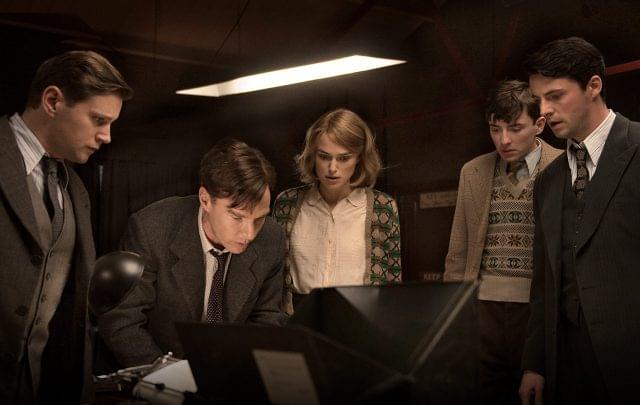
Alan Turing, the English math genius who cracked Nazi codes and was the father of computer science, deserves to be the subject of a masterful biopic someday. This is not that day. But “The Imitation Game” works as a glossy, conventionally entertaining account of Turing’s top-secret military work, with biopic elements before and after the war thrown in for good measure.
Played by velvet-throated otter impersonator Benedict Cumberbatch, the esteemed and eccentric Prof. Turing is seen first in 1951, when he’s the victim of a burglary yet behaves oddly enough to make a suspicious cop dig into his background. Then it is 1939, and 27-year-old Alan, already among the world’s greatest mathematicians, is chosen by skeptical naval Commander Denniston (Charles Dance) to join a team of cryptographers working feverishly to break the Germans’ Enigma code and win the war.
Wartime is where the bulk of the film takes place. Alan is logical-minded, socially awkward, prone to not getting jokes, and unfailingly rational. He recruits people with a knack for solving puzzles to help him build a machine of his own design that will theoretically defeat the Enigma code, which has trillions of possible permutations and changes every 24 hours. His teammates include cocky Hugh (Matthew Goode), friendly John (Allen Leech), a couple of nondescript other guys, and Joan Clarke (Keira Knightley), who everyone is amazed to find can break codes EVEN THOUGH SHE IS A LADY!
Written by Graham Moore from Andrew Hodges’ book and directed by Morten Tyldum (“Headhunters”), the movie smoothly falls into a familiar, pleasing, dopamine-producing rhythm. Blustery Denniston keeps threatening to shut down this cockamamie program unless it gets results, while MI-6 operative Stewart Menzies (Mark Strong) sees potential in Turing’s advanced ideas. Everyone is glib and witty in the manner of characters in screenplays, and there are hijinks. Oh, and one of them might be a Soviet spy! It’s all very Hollywood.
I should mention that it is also sometimes 1928, and obsessive schoolboy Alan (Alex Lawther), a budding genius, is anxiously separating his peas from his carrots at dinner and finding friendship with a fellow cryptography nerd (Jack Bannon). This is where another detail about Turing — that he was gay — comes to light, informing his wartime demeanor as a sexless, endearing robot baffled by romance. While his co-workers date and frolic, he enjoys a platonic partnership with Joan.
Solving the Enigma machine (spoiler alert: they do it) constitutes the story’s climax, but there are loose ends to wrap up that keep the movie going a while longer. The 1951 thread addresses Turing’s homosexuality and the barbaric way the law treated his kind in those days. These are necessary elements in an Alan Turing biography, but the subject isn’t handled with as much care as it warrants. “The Imitation Game” is a rollicking wartime story first, an appreciation of Turing’s life a distant second.
B- (1 hr., 53 min.; )
Originally published at GeekNation.





